

Study: Light And Sound Improves Alzheimer's. Published on April 25, 2020 Written by Mike McCrae Clumps of harmful proteins that interfere with brain functions have been partially cleared in mice using nothing but light and sound.
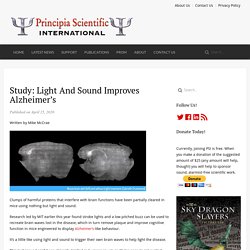
Research led by MIT earlier this year found strobe lights and a low pitched buzz can be used to recreate brain waves lost in the disease, which in turn remove plaque and improve cognitive function in mice engineered to display Alzheimer’s-like behaviour. It’s a little like using light and sound to trigger their own brain waves to help fight the disease. This technique hasn’t been clinically trialled in humans as yet, so it’s too soon to get excited – brain waves are known to work differently in humans and mice.
But, if replicated, these early results hint at a possible cheap and drug-free way to treat the common form of dementia. So how does it work? The only problem was this effect was confined to visual parts of the brain, missing key areas that contribute to the formation and retrieval of memory. Related. How to Fight Alzheimer's Disease with Intranasal Insulin — Optimal Living Dynamics. Overall, I believe the benefits outweigh the risks and it’s worth trying, especially if you’re struggling with mild cognitive impairment or early Alzheimer’s disease.
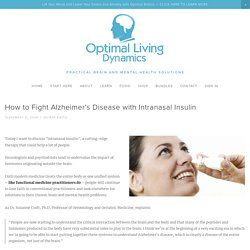
It may be another decade or more until the research trickles down and reaches your doctor’s office. Research shows that it takes about 17 years for new scientific evidence to be implemented in clinical practice. However, I’m not a doctor and you should definitely talk to your doctor about this if you’re considering trying it. If you have an open-minded doctor, perhaps they will support you in trying it. Don’t be surprised if they dismiss the idea entirely though. With that said, you can easily and legally buy insulin yourself. Effect of 40Hz Light Therapy On Amyloid Load. This pilot study examined whether marked 50% reduction of cortical Aβ observed in transgenic AD mice after short duration exposure to 40Hz light therapy would translate into human AD patients.
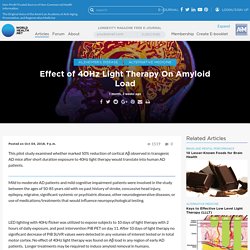
Mild to moderate AD patients and mild cognitive impairment patients were involved in the study between the ages of 50-85 years old with no past history of stroke, concussive head injury, epilepsy, migraine, significant systemic or psychiatric disease, other neurodegenerative diseases, or use of medications/treatments that would influence neuropsychological testing.
LED lighting with 40Hz flicker was utilized to expose subjects to 10 days of light therapy with 2 hours of daily exposure, and post intervention PiB PET on day 11. After 10 days of light therapy no significant decrease of PiB SUVR values were detected in any volumes of interest tested or in total motor cortex. Infrared Therapy for Alzheimer's and Parkinson's. Alzheimer's Disease Nutritional Strategies. Nutritional Interventions Studied in Alzheimer’s Huperzine A Derived from the plant Huperzia serrata, huperzine A is an NMDA receptor blocker than can help prevent or reduce glutamate-mediated excitotoxicity (Wang 1999).
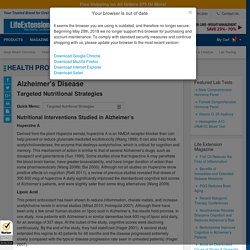
It can also help block acetylcholinesterase, the enzyme that destroys acetylcholine, which is critical for cognition and memory. Ultrasound Therapy for Preventing Brain Aging and Alzheimer’s. The 8+ Benefits Of J147: A Potent Curcumin Derivative (And How To Make T-006) — MyBioHack. J147 can improve synaptic plasticity in the brain and induce its growth.
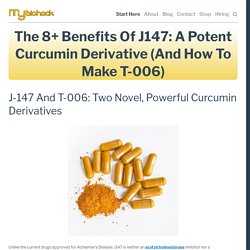
R J147 improves synaptic plasticity by maintaining the expression of Synaptophysin (a synaptic vesicle protein that is reduced in both aging and AD and is considered a biomarker for synapse loss). R J147 grows the brain by increasing levels of both Nerve Growth Factor (NGF) and Brain-Derived Neurotrophic Factor (BDNF). R A synthetic derivative of J147, T-006 (more discussed below on how to make it), can also improve neurite outgrowth by regulating the PI3K/AKT pathway and increasing NGF levels. 5.
J147 does not specifically need BDNF to be neuroprotective.
Alzheimer's Disease--Dr. Bredesen's Protocol. 20 Ways to Beat Alzheimer's Disease. 20 Ways to Beat Alzheimer’s Disease One of the fastest growing diseases in the industrial world is Alzheimer’s disease (AD).
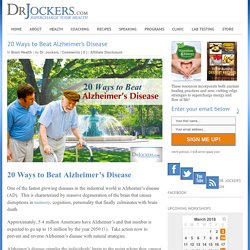
This is characterized by massive degeneration of the brain that causes disruptions in memory, cognition, personality that finally culminates with brain death. Approximately, 5.4 million Americans have Alzheimer’s and that number is expected to go up to 15 million by the year 2050 (1). We may be able to reverse early Alzheimer's disease. Gastrointestinal health has been linked with brain health.
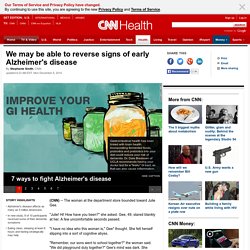
Incorporating fermented foods, probiotics and prebiotics into your diet could reduce your risk of dementia. Dr. Dale Bredesen of UCLA recommends having your doctor test for a "leaky" GI tract, as that can also cause inflammation. Eleven Steps for Overcoming Alzheimer’s and Other Chronic Infectious Diseases. Alzheimer's Natural Treatment Options & Notable Breakthroughs. Alzheimer’s disease is a form of dementia that can rob people of the ability to think clearly, perform everyday tasks and ultimately, remember who they even are.
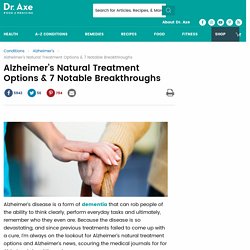
Because the disease is so devastating, and since previous treatments failed to come up with a cure, I’m always on the lookout for Alzheimer’s natural treatment options and Alzheimer’s news, scouring the medical journals for for Alzheimer’s breakthroughs. There’s so much we still don’t know about the human brain, but thankfully, 2016 marks a year of progress and some pretty significant Alzheimer’s breakthroughs. Let me share some of them with you. There are several theories including free radical damage, an inability to use glucose properly, vitamin deficiencies or environmental toxins. This illness affects a third of people over the age of 85 in the U.S. (1)
Using Neurobics to Improve Your Brain - DrJockers.com. Using Neurobics to Improve Your Brain Neurobics is a term that was described by the late neurobiologist Lawrence Katz and Manning Rubin in their book, Keep Your Brain Alive.
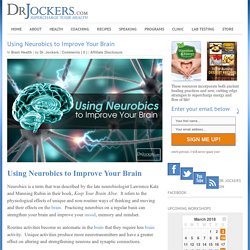
It refers to the physiological effects of unique and non-routine ways of thinking and moving and their effects on the brain. Practicing neurobics on a regular basis can strengthen your brain and improve your mood, memory and mindset. Routine activities become so automatic in the brain that they require less brain activity.
Fountain of youth? Dietary supplement may prevent and reverse severe damage to aging brain, research suggests. A dietary supplement containing a blend of thirty vitamins and minerals -- all natural ingredients widely available in health food stores -- has shown remarkable anti-aging properties that can prevent and even reverse massive brain cell loss, according to new research from McMaster University.
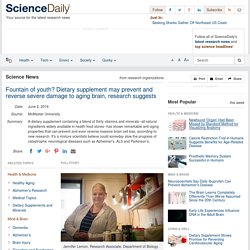
It's a mixture scientists believe could someday slow the progress of catastrophic neurological diseases such as Alzheimer's, ALS and Parkinson's. "The findings are dramatic," says Jennifer Lemon, research associate in the Department of Biology and a lead author of the study. "Our hope is that this supplement could offset some very serious illnesses and ultimately improve quality of life. " The formula, which contains common ingredients such as vitamins B, C and D, folic acid, green tea extract, cod liver oil and other nutraceuticals, was first designed by scientists in McMaster's Department of Biology in 2000.
A multi‐ingredient dietary supplement abolishes large‐scale brain cell loss, improves sensory function, and prevents neuronal atrophy in aging mice - Lemon - 2016 - Environmental and Molecular Mutagenesis. Alzheimer's Natural Treatment Options & Notable Breakthroughs. Safety, effectiveness of cognitive enhancers for Alzheimer's ranked. Pre and post testing show reversal of memory loss from Alzheimer's disease in 10 patients.
Evolutionary Psychiatry: Interesting Findings in Eating Disorders and Alzheimer's. First off, everyone take a couple of hours and hop on over to Robb Wolf's blog and listen to his podcast with Dr. Kurt Harris. As usual, Kurt pulls it all together with fun and flair and a hefty serving of common sense. He gives me and my blog a few mentions, which is very much appreciated, as always :) An important caveat is that these numbers are generated from billing codes. If someone comes to see me at the office, I am obligated (if I want to be paid by the insurance company) to generate a code based on a DSMIV diagnosis that I put on a billing form. It is actually rather difficult and getting more difficult all the time to be hospitalized for psychiatric disorders in general.
Humanin: 7+ Ways To Increase Mitochondria's IGF-1 — MyBioHack. HN can inhibit pancreatic beta-cell death and improve Glucose tolerance in non-obese diabetic (NOD) animal models. R This may be beneficial for both Type 1 Diabetes (T1D) and Type 2 Diabetes (T2D). R R By acting on the hypothalamus, HN can also increase Insulin sensitivity in the liver and stabilize blood glucose levels. R HN may be a good biomarker for fasting glucose-related oxidative stress. HNG acutely increases Triglyceride (TG) secretion from the liver. 7. A Bold New Experimental Treatment for Alzheimer's Dementia. Source: Alzheimer’s Dementia is a neurodegenerative condition that affects five million Americans in 2014.
In fact, a third of seniors will die with the disease or another type of dementia (1 (link is external)). The cause is unknown, but over time the brain cells begin to fill up with waste products and die, leading to an inflammatory reaction in the brain that seems to add to the problem and accelerate the disease. The only FDA-approved treatments are certain medicines of the class of cholinesterase inhibitors. These medicines slow down the breakdown of the neurotransmitter acetylcholine, helping damaged brain cells work better for a time. Some time ago I wrote an article about one of these lines of inquiry, ketogenic diets and Alzheimer’s disease (link is external). The theory seemed reasonable to Mary Newport, a physician whose husband was diagnosed with Alzheimer’s years ago.
Ketone esters are in a class of supplements called “generally recognized as safe” or GRAS by the FDA. Alzheimer’s news: 'Life-changing' improvements after magnetic pulse treatment. The “NeuroAD” treatment involves projecting a magnetic field into sufferers’ heads while they solve problems and puzzles. “Promising” early results from trials on those suffering the early stages of Alzheimer’s have confirmed that the full onset of the illness can be slowed by up to a year with the groundbreaking method. The treatment stimulates parts of the brain responsible for memory and learning and offers fresh hope to patients with established mild to moderate Alzheimer’s disease. To date 16 patients have been treated in the UK using the system and they have all demonstrated significant improvements in their cognitive function.
These positive results are consistent with numerous patients treated in Europe, Asia and the USA. Memory improvement following induced hyperinsulinemia in alzheimer's disease. JavaScript is disabled on your browser. Please enable JavaScript to use all the features on this page. Abstract. Rapid cognitive improvement in Alzheimer's disease following perispinal etanercept administration.
The authors' preferred hypothesis to explain the rapid clinical improvement observed centers on the emerging evidence, which suggests that TNF-alpha is of critical importance in the regulation of synaptic transmission in the brain. Dementia and Alzheimer's: Improvement Seen With Hearing Loss Treatment. Alzheimer's disease: improvement of visual memory and visuoconstructive performance by treatment with picotesla range magnetic fields. - PubMed - NCBI.
Bacopa: The Brain-Boosting, Safer ADHD Treatment. What if I told you there was a plant used to treat memory and brain-related disorder for thousands of years — a plant thought to be so beneficial to the mind that it’s been a staple of traditional Ayurvedic medicine in India since seemingly forever? You’d be excited about its possible application, right? Then you’re in luck, because bacopa checks off both these boxes and then some. Also known as Brahmi, bacopa is used to treat a broad range of mind-related health concerns, including Alzheimer’s disease, memory loss, anxiety, attention deficit-hyperactivity disorder (ADHD) symptoms, epilepsy, and as a general tonic to fight stress. Best of all, it has far less severe side effects than the dangerous psychotropic drugs often prescribed today. People also take bacopa to treat backache, joint pain, and sexual performance problems in both men and women. (1) 1.
It’s been shown that up to 90 percent of all visits to primary care physicians are for stress-related complaints — 90 percent! 2. 3. Healthy mitochondria could stop Alzheimer's. PET tracer gauges effectiveness of promising Alzheimer's treatment. New Treatments for Alzheimer's Shown to Improve Memory. Hyperbaric oxygen therapy may alleviate symptoms of Alzheimer's Disease.
How SORLA protects against Alzheimer's disease. Intervention becomes first to successfully reduce risk of dementia. Saving neurons may offer new approach for treating Alzheimer's disease. New test paves way for potential treatments to target Alzheimer's and other conditions. Using omega 3 fatty acids to treat Alzheimer's and other diseases? Naturally occurring molecule may help prevent, treat atherosclerosis and gum disease.
Unique visual stimulation may be new treatment for Alzheimer's. Cannabinoids remove plaque-forming Alzheimer's proteins from brain cells. Salk Institute scientists have found preliminary evidence that tetrahydrocannabinol (THC) and other compounds found in marijuana can promote the cellular removal of amyloid beta, a toxic protein associated with Alzheimer's disease. While these exploratory studies were conducted in neurons grown in the laboratory, they may offer insight into the role of inflammation in Alzheimer's disease and could provide clues to developing novel therapeutics for the disorder. "Although other studies have offered evidence that cannabinoids might be neuroprotective against the symptoms of Alzheimer's, we believe our study is the first to demonstrate that cannabinoids affect both inflammation and amyloid beta accumulation in nerve cells," says Salk Professor David Schubert, the senior author of the paper.
Antibiotics weaken Alzheimer's disease progression through changes in the gut microbiome. Antibiotic restores cell communication in brain areas damaged by Alzheimer's-like disease in mice. New treatment option for Alzheimer's disease possible, say researchers. Resveratrol appears to restore blood-brain barrier integrity in Alzheimer's disease. Probiotics improve cognition in Alzheimer's patients. For the first time, scientists have shown that probiotics -- beneficial live bacteria and yeasts taken as dietary supplements -- can improve cognitive function in humans.
In a new clinical trial, scientists show that a daily dose of probiotic Lactobacillus and Bifidobacterium bacteria taken over a period of just 12 weeks is enough to yield a moderate but significant improvement in the score of elderly Alzheimer's patients on the Mini-Mental State Examination (MMSE) scale, a standard measure of cognitive impairment. Probiotics are known to give partial protection against certain infectious diarrheas, irritable bowel syndrome, inflammatory bowel disease, eczema, allergies, colds, tooth decay, and periodontal disease. Here, the researchers, from Kashan University of Medical Sciences, Kashan, and Islamic Azad University, Tehran, Iran, present results from a randomized, double-blind, controlled clinical trial on a total of 52 women and men with Alzheimer's between 60 and 95 years of age.